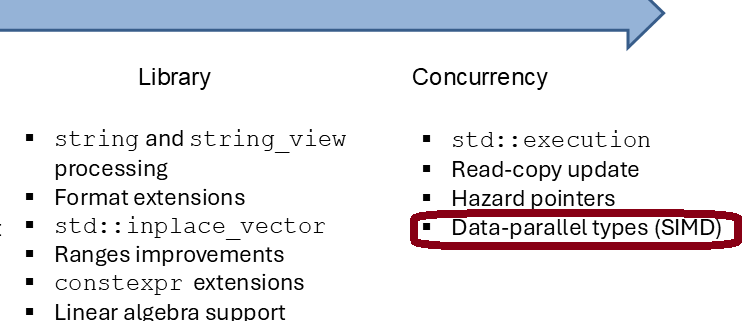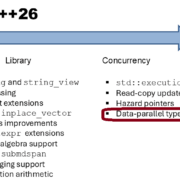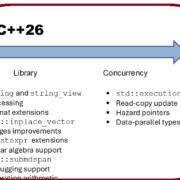Data-Parallel Types: Reduction
In this article, I will discuss reduction and mask reduction for data-parallel types.

Reduction
A reduction reduces the SIMD vector to a single element. The library provides three functions for this purpose: reduce, hmin, and hmax.
The following program shows how these functions are used.
// reduction.cpp #include <array> #include <experimental/simd> #include <functional> #include <iostream> #include <string_view> namespace stdx = std::experimental; void println(std::string_view name, auto const& a) { std::cout << name << ": "; for (std::size_t i{}; i != std::size(a); ++i) std::cout << a[i] << ' '; std::cout << '\n'; } int main() { const stdx::fixed_size_simd<int, 16> a([](int i) { return i; }); println("a", a); auto sum = stdx::reduce(a); std::cout << "sum: " << sum << "\n\n"; const stdx::fixed_size_simd<int, 8> b([](int i) { return i + 1; }); println("b", b); auto product = stdx::reduce(b, std::multiplies<>()); std::cout << "product: " << product << "\n\n"; auto maximum = stdx::hmax(b); std::cout << "maximum: " << maximum << "\n\n"; auto minimum = stdx::hmin(b); std::cout << "minimum: " << minimum << "\n\n"; }
First, the reduce function is used. By default, the + operator is applied in the usual way. However, this function can also be parameterized with any binary operator. The expression stdx::reduce(b, std::multiplies<>()) applies the function object std::multiplies from the header functional. The functions hmax and hmin determine the maximum and minimum of the SIMD vector b.
Finally, the program output follows:
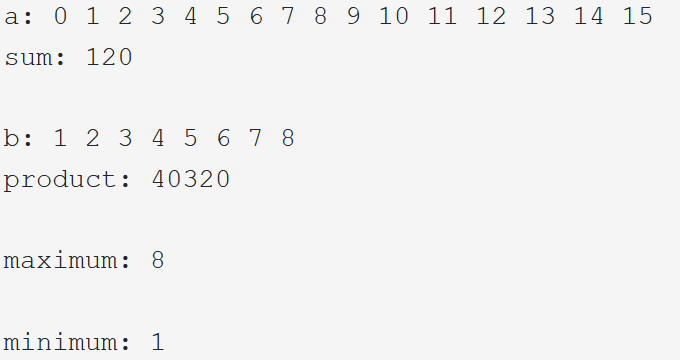
Mask Reduction
When reducing a mask, the SIMD mask is reduced to either true or false value.
all_of, any_of, none_of, and some_of
Here we encounter some old friends from C++: all_of, any_of, none_of, and some_of. When using these functions, the SIMD mask is reduced to either true or false value.
all_of: Returnstrueif all values in the SIMD mask aretrue.any_of: Returnstrueif at least one value in the SIMD mask istrue.none_of: Returnstrueif all values in the SIMD mask arefalse.some_of: Returnstrueif at least one value in the SIMD mask istrue, but not all values in it aretrue.
cppreference.com has a nice example of these functions:
// reductionWithMask.cpp #include <cassert> #include <experimental/simd> namespace stq = std::experimental; int main() { using mask = stq::fixed_size_simd_mask<int, 4>; mask mask1{false}; // = {0, 0, 0, 0} assert ( stq::none_of(mask1) == true && stq::any_of(mask1) == false && stq::some_of(mask1) == false && stq::all_of(mask1) == false ); mask mask2{true}; // = {1, 1, 1, 1} assert ( stq::none_of(mask2) == false && stq::any_of(mask2) == true && stq::some_of(mask2) == false && stq::all_of(mask2) == true ); mask mask3{true}; mask3[0] = mask3[1] = false; // mask3 = {0, 0, 1, 1} assert ( stq::none_of(mask3) == false && stq::any_of(mask3) == true && stq::some_of(mask3) == true && stq::all_of(mask3) == false ); }
popcount
popcount determines how many values in a SIMD mask are true. A program can be written quickly to do this:
// popcount.cpp #include <experimental/simd> #include <iostream> #include <string_view> namespace stdx = std::experimental; void println(std::string_view name, auto const& a) { std::cout << std::boolalpha << name << ": "; for (std::size_t i{}; i != std::size(a); ++i) std::cout << a[i] << ' '; std::cout << '\n'; } int main() { const stdx::native_simd<int> a = 1; println("a", a); const stdx::native_simd<int> b([](int i) { return i - 2; }); println("b", b); const auto c = a + b; println("c", c); const stdx::native_simd_mask x = c < 0; println("x", x); auto cnt = popcount(x); std::cout << "cnt: " << cnt << '\n'; }
Thanks to the program output, this should be self-explanatory.
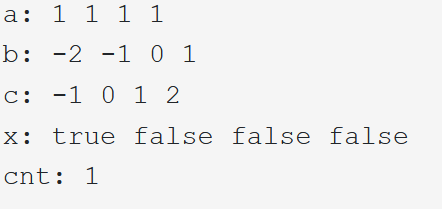
find_first_set and find_last_set
find_first_set: Returns the lowest index i where the SIMD mask istrue.find_last_set: Returns the greatest index i where the SIMD mask istrue.
The following program demonstrates the two functions in use:
// find_first_set.cpp #include <experimental/simd> #include <iostream> #include <string_view> namespace stdx = std::experimental; void println(std::string_view name, auto const& a) { std::cout << std::boolalpha << name << ": "; for (std::size_t i{}; i != std::size(a); ++i) std::cout << a[i] << ' '; std::cout << '\n'; } int main() { stdx::simd_mask<short> x{0}; println("x", x); x[1] = true; x[x.size() - 1] = true; println("x", x); auto first = stdx::find_first_set(x); std::cout << "find_first_set(x): " << first << '\n'; auto last = stdx::find_last_set(x); std::cout << "find_last_set(x): " << last<< '\n'; }
Finally, here is the output of the program:
 Modernes C++ Mentoring
Modernes C++ Mentoring
Do you want to stay informed: Subscribe.

What’s next?
In my next article, I will focus on the algorithms of data-parallel types.
Thanks a lot to my Patreon Supporters: Matt Braun, Roman Postanciuc, Tobias Zindl, G Prvulovic, Reinhold Dröge, Abernitzke, Frank Grimm, Sakib, Broeserl, António Pina, Sergey Agafyin, Андрей Бурмистров, Jake, GS, Lawton Shoemake, Jozo Leko, John Breland, Venkat Nandam, Jose Francisco, Douglas Tinkham, Kuchlong Kuchlong, Robert Blanch, Truels Wissneth, Mario Luoni, Friedrich Huber, lennonli, Pramod Tikare Muralidhara, Peter Ware, Daniel Hufschläger, Alessandro Pezzato, Bob Perry, Satish Vangipuram, Andi Ireland, Richard Ohnemus, Michael Dunsky, Leo Goodstadt, John Wiederhirn, Yacob Cohen-Arazi, Florian Tischler, Robin Furness, Michael Young, Holger Detering, Bernd Mühlhaus, Stephen Kelley, Kyle Dean, Tusar Palauri, Juan Dent, George Liao, Daniel Ceperley, Jon T Hess, Stephen Totten, Wolfgang Fütterer, Matthias Grün, Ben Atakora, Ann Shatoff, Rob North, Bhavith C Achar, Marco Parri Empoli, Philipp Lenk, Charles-Jianye Chen, Keith Jeffery, Matt Godbolt, Honey Sukesan, bruce_lee_wayne, Silviu Ardelean, schnapper79, Seeker, and Sundareswaran Senthilvel.
Thanks, in particular, to Jon Hess, Lakshman, Christian Wittenhorst, Sherhy Pyton, Dendi Suhubdy, Sudhakar Belagurusamy, Richard Sargeant, Rusty Fleming, John Nebel, Mipko, Alicja Kaminska, Slavko Radman, and David Poole.
| My special thanks to Embarcadero |  |
| My special thanks to PVS-Studio |  |
| My special thanks to Tipi.build |  |
| My special thanks to Take Up Code |  |
| My special thanks to SHAVEDYAKS |  |
Modernes C++ GmbH
Modernes C++ Mentoring (English)
Rainer Grimm
Yalovastraße 20
72108 Rottenburg
Mail: schulung@ModernesCpp.de
Mentoring: www.ModernesCpp.org


